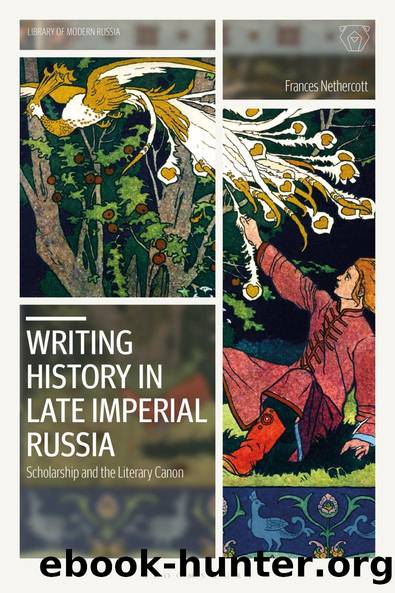Writing History in Late Imperial Russia: Scholarship and the Literary Canon by Frances Nethercott

Author:Frances Nethercott [Nethercott, Frances]
Language: eng
Format: epub
Tags: History, General, Historiography, Russia & the Former Soviet Union, Modern
ISBN: 9781350130418
Google: CS_EDwAAQBAJ
Goodreads: 49512247
Publisher: Bloomsbury Academic
Published: 2019-12-26T00:00:00+00:00
8
Historical and Literary Historical Scholarship: A Hybrid Science?
Across Europe during the first half of the nineteenth century, conventional wisdom had it that folklore is deeply, even uniquely, expressive of the community in which it was produced and thus could be of great value to the historian. Among the major sources of inspiration for this view were, of course, Johann Gottfried Herder (his name is often associated with the term Volksgeist1) and the mythological and linguistic theories of Jacob Grimm. In France, Augustin Thierry and Jules Michelet both championed this way of thinking about the past. For Michelet, the oral tradition captured in song and legends provided a profound sense of historical reality because it retained âthe warmth of peopleâs voices and the presence of their bodiesâ. And Thierry, in his three-volume study, Histoire de la conquête de lâAngleterre par les Normands (1825), was, as Donald Kelley notes, equally clear that literary remains rendered most truthfully the spirit of the tribes that lived in Britain at that time: âThe ancient Britons lived and breathed poetryâ, Thierry wrote. âThe expression may seem extravagant, but not so in reality: for, in their political maxims, preserved to our own times, they placed the poetâmusician beside the agriculturalist and the artist, as one of the three pillars of social existence. The poet had but one theme: the destiny of his country, its misfortunes and its hopesâ.2
Around 1850, as the romantic ethos gradually gave way to empirical evidence-based enquiry, the importance ascribed to âfeelingsâ, âspiritâ or the senses was, as I have argued, eclipsed by endeavours to establish the credentials of historical study as an exact (empirical) science. In practice, this required the strict exclusion of the spoken language (oral tradition) as a viable historical source. Historical explanation and style of presentation also needed to be revised. Addressing this matter, one of the chief architects of the âscientific methodâ, Gabriel Monod, called for the removal of what he termed âvague generalities or oratoryâ: instead, âevery statement would be accompanied by proofs, by references to sources and quotationsâ.3 It remained, however, that if the demands of âscienceâ, understood as commonsense empiricism, were now deemed premium, the question of whether imaginative literature could be of any evidential value did not go away; rather, it was brought back on to the agenda in response to developments in literary historical scholarship as a branch of positivist-scientific study and to questions pertaining to the types of relationship between the two disciplines: should the history of literature be considered a separate branch with its own distinctive methodology and practices, or should it be subsumed under historical scholarship? Debates concerning the place of imaginative literature in historical research, moreover, fed into broader questions about the scientific/scholarly credentials of the discipline, and possibly the most vexed question of all that historians posed in tandem with reflections on the relationship between literary history/history of literature and âgeneralistâ history was an age-old conundrum: is history itself a science or an art? In France, a catalyst for
Download
This site does not store any files on its server. We only index and link to content provided by other sites. Please contact the content providers to delete copyright contents if any and email us, we'll remove relevant links or contents immediately.
The World Almanac and Book of Facts 2021 by Sarah Janssen(873)
The emperor wears no clothes by Jack Herer(379)
The Way Home by Unknown(347)
The Crises of Civilization by Dipesh Chakrabarty(324)
History of India: A History In 50 Events by Hourly History(288)
Darius in the Shadow of Alexander by Pierre Briant(282)
Hidden Links by Zac Sangeeth & Sangeeth Varghese(268)
The History of Human Marriage by Edward Westermarck(263)
A Military History of the Cold War, 1962â1991 by Jonathan M. House(260)
Prehistoric Europe by Champion Timothy. Whittle Alasdair. Shennan Stephen. Gamble Clive(251)
Flood Legends: Global Clues of a Common Event by Charles Martin(244)
History of the Jews: An Enthralling Guide from Ancient Times to the Present (Religion in Past Times) by Wellman Billy(232)
Chinese History: 500 Interesting Facts About China (Curious Histories Collection) by Ahoy Publications(222)
The Education of Historians for Twenty-First Century by Thomas Bender; Philip F. Katz; Colin A. Palmer(211)
Big Tent by Mallory Factor(209)
The Philosophy of Historiography by John Lange(201)
Mark Of The Scots - Cl by Duncan A. Bruce(200)
Other Pasts, Different Presents, Alternative Futures by Jeremy Black(199)
Ancient Roman Sports, A-Z : Athletes, Venues, Events and Terms by David Matz(194)
